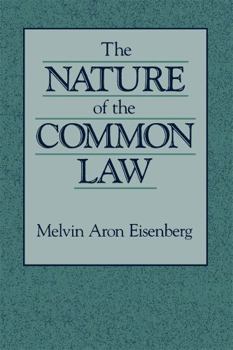The Nature of the Common Law
Select Format
Select Condition 
Book Overview
Much of our law is based on authoritative texts, such as constitutions and statutes. The common law, in contrast, is that part of the law that is established by the courts. Common law rules predominate in some areas of law, such as torts and contracts, and are extremely important in other areas, such as corporations. Nevertheless, it has been far from clear what principles courts use--or should use--in establishing common law rules. In this lucid...
Format:Paperback
Language:English
ISBN:0674604814
ISBN13:9780674604810
Release Date:October 1991
Publisher:Harvard University Press
Length:224 Pages
Weight:0.72 lbs.
Dimensions:0.6" x 6.1" x 9.3"
Customer Reviews
2 ratings
a Chinese version is published now!
Published by Thriftbooks.com User , 20 years ago
hello, I want to tell a news about this book.a Chinese version is published now!I am graduated in Law School of Renmin University of China.In college, a professor, doctors and I translated this book into Chinese,we all study Jurisprudence. We try our best to master the spirit of this book and translate accurately.Now the Chinese version is published, we want to let more and more chinese students know it.who can do me a favour?Please send some introduction material of the nature of the common law.please send it to [email protected]. Wish to learn from your law system and exchange ideas. All best regards.
An underappreciated modern classic--Highly recommended
Published by Thriftbooks.com User , 24 years ago
In his ambitiously titled book, "The Nature of the Common Law," Professor Melvin Eisenberg's stated goal "is to develop the institutional principles that govern the way in which the common law is established in our society." In doing so, Eisenberg addresses the functions of courts in American society, modes of legal reasoning and the process of overturning prior precedents. Yet Eisenberg never loses sight of his central thesis, namely that "all common law cases are decided under a unified methodology, and under this methodology social propositions always figure in determining the rules the courts establish and the way in which those rules are extended, restricted, and applied." To say that courts should and do rely on social propositions (such as moral norms and public policy) in deciding common law cases is hardly new. Eisenberg's contribution comes in mapping a coherent course between the Scylla and Charybdis of modern jurisprudence. He explicitly rejects theories claiming that some cases can be decided without reference to social propositions. On the other hand, Eisenberg also rejects theories claiming that legal reasoning is nothing more than a mask for the social and political values of the decisionmaker. Any complex society needs an institution before which claims based on existing societal standards can be heard. In our society, that institution is the courts. "If the courts resolved disputes by reasoning from those moral norms and policies they think best, there would be no institution to which a member of the society could go to vindicate a claim of right based on existing standards." Second, since the judicial system is a peculiarly undemocratic institution, the legitimacy of the adjudicative process requires courts to look to "existing legal and social standards rather than those standards the court thinks best." Finally, prohibiting the courts from employing their personal standards makes legal reasoning fairer and more easily replicable by the profession.Common law adjudication thus is not merely the ad hoc application of whatever social propositions a particular judge is taken by; rather, he lays out institutional principles that constrain and guide the adjudicative use of social propositions. According to Eisenberg, adjudicators may only employ those norms or policies that "can fairly be said to have substantial support in the community, can be derived from norms [or policies] that have such support, or appear as if they would have such support." Two critical assumptions underlie this claim: (1) that social morality is a meaningful concept; and (2) that judges are capable of discerning and effectively applying social morality. As space does not permit one to do full justice to Eisenberg's defense of those assumptions, suffice it to say that the argument is well-crafted and even-handed.Eisenberg's second claim is that courts have a duty to utilize only those social propositions that hav






